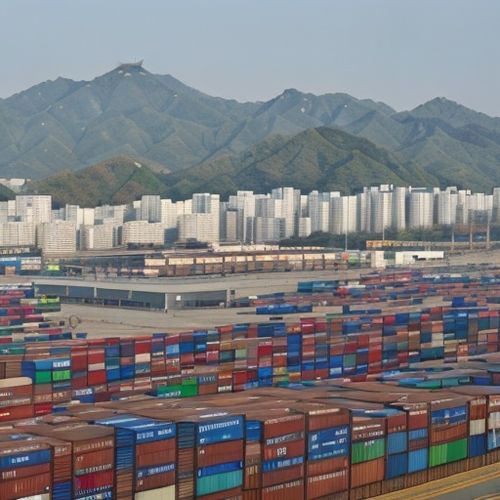In a striking shift that underscores the growing global influence of Korean pop culture, South Korea’s music industry has surpassed its auto parts sector in export revenue for the first time. According to recent data, K-pop and other music-related exports reached a staggering $12 billion in the past year, eclipsing the $11 billion generated by automotive components. This milestone reflects not only the explosive popularity of Korean entertainment but also the country’s evolving economic landscape, where soft power is increasingly driving growth.
The rise of K-pop as a global phenomenon has been nothing short of meteoric. Over the past decade, groups like BTS, BLACKPINK, and TWICE have cultivated massive international fanbases, propelling Korean music to the forefront of the global entertainment industry. Concerts, merchandise, streaming revenue, and licensing deals have all contributed to this surge, with fans across Asia, North America, and Europe eagerly consuming content. The industry’s success is further amplified by strategic collaborations with global brands and platforms like YouTube and Spotify, which have helped Korean artists reach unprecedented audiences.
Meanwhile, South Korea’s auto parts sector, long a cornerstone of the nation’s export-driven economy, has faced headwinds. Supply chain disruptions, fluctuating demand, and increased competition from Chinese manufacturers have tempered growth. While the automotive industry remains a critical part of the economy, its slower expansion in comparison to the music sector highlights a broader trend: the increasing economic value of cultural exports in an interconnected world.
Experts attribute the music industry’s success to a combination of factors, including meticulous artist training, innovative marketing, and government support. South Korea’s entertainment agencies are renowned for their rigorous training systems, which groom idols for years before debut. This investment in talent has paid off handsomely, as Korean artists consistently deliver high-quality performances that resonate globally. Additionally, the government has actively promoted K-culture through initiatives like the Korean Wave (Hallyu) strategy, which seeks to leverage cultural exports as a key economic driver.
The $12 billion figure encompasses not just music sales but also ancillary revenue streams such as concerts, fan meetings, and branded merchandise. Tours by top-tier acts like BTS and BLACKPINK have shattered records, with sold-out stadium shows in major cities worldwide. Merchandise sales, from light sticks to clothing lines, have also become a lucrative business, as fans seek tangible connections to their favorite artists. Furthermore, the rise of digital platforms has enabled Korean music to penetrate markets that were previously difficult to access, amplifying its financial impact.
This shift in export dominance raises intriguing questions about the future of South Korea’s economy. While manufacturing and technology exports remain vital, the explosive growth of cultural industries suggests that the country’s economic identity is diversifying. The success of K-pop demonstrates that intangible assets—creativity, branding, and cultural appeal—can generate substantial revenue in the digital age. As the global appetite for Korean entertainment shows no signs of waning, the music industry’s contribution to the national economy is likely to keep expanding.
However, challenges remain. The music industry’s reliance on a handful of superstar acts raises concerns about sustainability. While BTS and BLACKPINK dominate headlines, newer groups must navigate an increasingly crowded market. Additionally, geopolitical tensions and shifting trade policies could impact the industry’s global reach. Nevertheless, the sector’s adaptability and innovative spirit suggest it is well-positioned to weather these uncertainties.
For now, the $12 billion milestone stands as a testament to the power of cultural exports in the 21st century. South Korea’s ability to transform its artistic output into a formidable economic force offers lessons for other nations seeking to harness the potential of their creative industries. As K-pop continues to break barriers and captivate audiences worldwide, its financial triumph over traditional sectors like auto parts marks a defining moment in the country’s economic narrative.

By Olivia Reed/Apr 13, 2025

By William Miller/Apr 13, 2025

By Amanda Phillips/Apr 13, 2025

By Megan Clark/Apr 13, 2025

By Joshua Howard/Apr 13, 2025

By Samuel Cooper/Apr 13, 2025

By Elizabeth Taylor/Apr 13, 2025

By Eric Ward/Apr 13, 2025

By Emma Thompson/Apr 13, 2025

By Noah Bell/Apr 13, 2025

By Sarah Davis/Apr 13, 2025

By Eric Ward/Apr 13, 2025

By Daniel Scott/Apr 13, 2025

By Benjamin Evans/Apr 13, 2025

By Elizabeth Taylor/Apr 13, 2025

By Grace Cox/Apr 13, 2025

By Megan Clark/Apr 13, 2025

By Benjamin Evans/Apr 13, 2025

By Thomas Roberts/Apr 13, 2025

By Sarah Davis/Apr 13, 2025